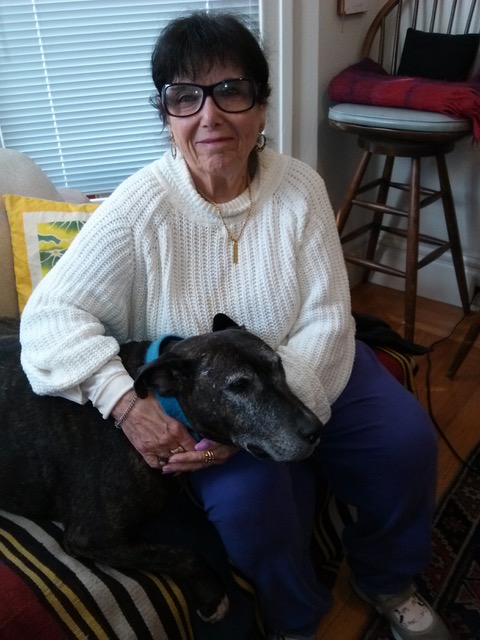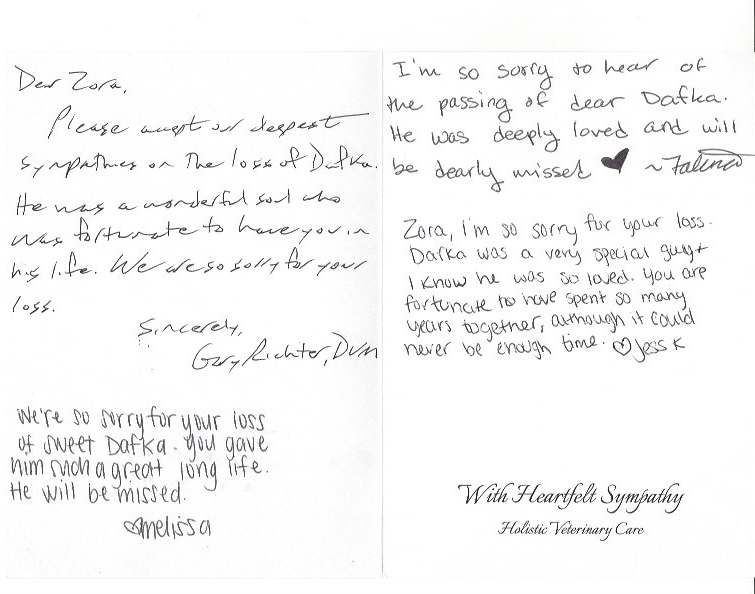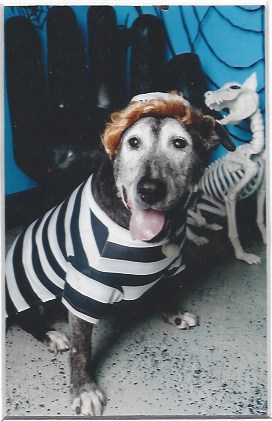
Dafka
On Friday, August 12 I said goodbye to my beloved Dafka, companion and co-therapist for fifteen years. He transitioned over the Rainbow Bridge due to cancer. Many of our neighbors in Russian Hill knew Dafka from our time together and our treks around the blocks of our neighborhood. My dog walker and friend, Nick, calls him “The King of Russian Hill“. His other monikers were “Mayor of Polk Street” and “His Majesty”.
A memorial service is being held on September 11. If you’re interested in attending, please contact me.
Please scroll through the gallery of Dafka’s pictures. He loved dressing in costume (he did live in San Francisco!) and won a top prize at the Pier 23 Cafe’s Doggie Costume Contest in 2019.
MEMORIALS
Thank you to those who commented on my Nextdoor post with such caring and thoughtful words for Dafka and for me. Here are some of those memorial notes and drawings made in honor of Dakfa.

Dafka as drawn by Frederick 




About Pet Bereavement
I had a dog. He was big and black. His name was Mummzer; he was a boxer, lab and pit mix. He was a rescue dog and I loved him dearly. He made me laugh, and sometimes I would get very angry with him. It had taken me a long time to get him.
Before I got Mummzer, long before I got Mummzer, I had a cat, the first cat I had ever owned. He was a beautiful gray Siamese Lilac Point, and I loved him dearly. His name was Khamudi which means “My Sweet” in Hebrew. Cats are supposed to live a long time, right? I expected to have Khamudi with me for at least twelve or fifteen years. This, however, was not to be. At age four or so, Khamudi got sick, very sick. I won’t explain to you what was wrong with him. Suffice it to say that I did everything I could to save him. I put him through torture in trying to save him. I feel very badly about what I did with him, and I would never humiliate one of my animals again.
I know, now, that what I was doing when I subjected him to all those indignities, when I humiliated and tormented Khamudi by all of the treatments I put him through, I was trying to postpone my feelings of grief and loss over not having my beautiful cat in my life. When Mummzer was six, or so, he got sick. He developed brain cancer. It was so hard for me to let him go, and I kept my promise to myself and Khamudi. I did not torture nor humiliate Mummzer. When it was time to say good-bye, I invited his friends over so that we all could say good-bye and tell him how much we loved him. Just writing this makes me feel teary and I do have another wonderful dog now.
We do grieve our animals and this is normal and natural. We have tended them, and nursed them, and caressed them. They, in turn, have tended us, nursed us, and caressed us. They have made us laugh, and maybe made us cry. They have also made us angry. No matter what our other feelings are, we love our pets. People who have never had pets may not understand this and say hurtful things. Please know that the feelings that you have are normal and natural and there is no time limit on your grieving. You will take as long as you need to take.
We go through a grieving process. The feelings that we go through when grieving the loss of a loved one, including our pets, are:
- Denial
- Anger
- Bargaining
- Depression
- Acceptance
We do not go through these feelings in a straight line, from one to the other. We jump around and may certainly feel more than one at the same time.
Zora









You must be logged in to post a comment.